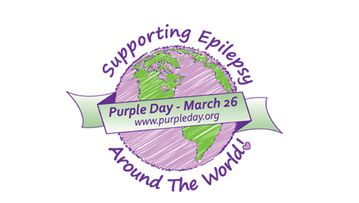Purple Day!
NewsIt's Purple Day! We've been talking to Claire Bishop about her experiences as a mother of five, where two of her children have epilepsy, and she has explained how no two seizures are the same. We're challenging ourselves - and would like to challenge you - to increase our understanding of epilepsy a little, so we can support people like Claire better.
The basics
Do you know what to do if someone has a tonic-clonic seizure - the kind we often associate with epilepsy? This video from the Red Cross gives basic first aid knowledge and the NHS website goes through what to do during and after.
If any type of seizure goes on for more than 5 minutes, it is known as status epilepticus and may require emergency medication and support. This can be easier to spot with a tonic-clonic seizure than with a focal or absent seizure.
Claire explains that in status epilepticus one of her children tends to experience a rapid drop in their oxygen saturation and an increased heart rate which can result in both respiratory and cardiac arrest, whilst the other tends to also quickly drop in oxygen - and that checking their oxygen levels can often be the only indication she has of how badly a seizure is affecting them.
'The other day Alfie had an absent seizure, but he was aware of me - he couldn't talk but he could make eye contact and push me away when I was helping him.
It didn't seem very bad - but when I checked his oxygen, it was down to 50%. I wouldn't have known how badly it was affecting him if I hadn't checked his oxygen.'
A solid understanding
Wev'e developed a short, free online course, Epilepsy Bitesize, to help healthcare professionals gain a good baseline understanding of epilepsy and its management. The seven on-demand sessions feature expert speakers and cover an introduction to seizures, diagnosis, treatment, management, women's health and epilepsy, and lived experience and is available online now.
Related articles

Living with epilepsy - Worries and wishes

Living with epilepsy - No seizure is the same
Optimised education, compassionate care
Epilepsy Academy seeks to raise awareness of epilepsy, equipping professionals to deliver compassionate, holistic care that transforms people's lives.